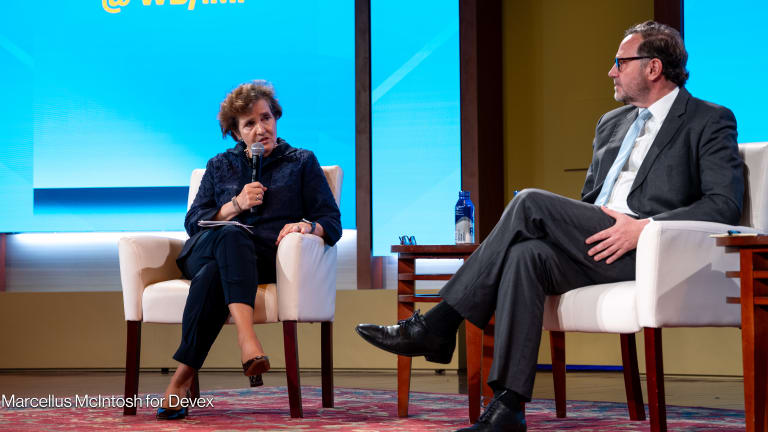
WASHINGTON — The Millenium Challenge Corporation, which had been without a Senate-confirmed leader for more than two years, now has a new CEO: Sean Cairncross.
The road to Tuesday’s confirmation was a long one, and it’s been a bumpy ride for the agency that has counted four leaders in the past year. Cairncross was originally nominated for the post in January 2018 and had a confirmation hearing in February of that year. But his nomination languished in the Senate as some Senators, notably Sen. Bob Menendez, a Democrat from New Jersey, objected to his nomination. At the end of the year, Cairncross’ nomination expired and he was renominated for the post in January.
“The reason it took so long is most likely no fault of the nominee, but suspicion on both sides of the aisle that the Trump administration was making an agency focused on the most effective way [to deliver development] a dumping ground of political incompetence,” a former administration official who wished to remain anonymous told Devex.
“Decisions were being made by committee, which is no way to innovate — and MCC is known for innovation.”
— former Hill staffer who worked on MCCCongress was trying to protect a “jewel of an agency,” the official said, and one consequence was that the agency’s influence and voice were diminished during a pivotal time of transition in U.S. aid.
Sean Cairncross’ journey to MCC:
Cairncross served as the deputy assistant to the president and senior adviser to the White House chief of staff before his nomination and is a lawyer with a long history of working for the Republican party, including serving as the COO of the Republican National Committee. As he awaited confirmation, he spent some time working at the Overseas Private Investment Corporation, according to several sources.
While Cairncross’ nomination was originally met with skepticism by some in the development community, it seems many are just happy for MCC to now have a permanent leader with political clout to represent the agency.
“This is great for the agency,” a former Hill staffer who worked on MCC and requested anonymity to speak freely told Devex. “It’s been leaderless for a while and it’s hard for an agency not to have a final decider. Decisions were being made by committee, which is no way to innovate — and MCC is known for innovation.”
It has been a critical time in U.S. development policy, with the passage of legislation that reshaped the aid landscape by creating a new U.S. Development Finance Corporation — yet MCC has been under-discussed, said Tim Docking, managing director at the Refugee Investment Network who is on MCC’s private sector advisory council.
“Until this point, MCC really hasn’t had a seat at the table in this administration for most of this time, in one of the most important times in U.S. development policy,” he said. “MCC needs to be there to sort of make sure its authorities are reserved for it,” Docking said, adding that a Senate-confirmed leader is “needed to shepherd this process and help write the next chapter of MCC’s story.”
While the past two years at MCC “haven’t been a lost cause,” and the agency has continued working, it was a period of lost opportunities, he said.
What Cairncross said then:
On Feb. 28, 2018, the Senate Committee on Foreign Relations held a confirmation hearing for Cairncross. Here’s what he said:
He has studied international affairs up to postgraduate level.
His management background — overseeing hundreds of employees and large budgets — would serve him well as CEO of MCC.
He will “strive to keep MCC a performance-based, professional organization” and is “not looking to politicize it.”
Three priorities: maintaining the agency’s model and track record of accountable results; deepening bipartisan support for the agency, relying on its staff; and increasing collaboration with other U.S. agencies and companies to tap private sector and domestic resources to help ”realize” regional compacts.
“To Sean’s credit he’s stuck with this, he wants the job,” Docking said. “I think, sort of ironically he’s more suited for it, better prepared for it, given his time studying for the position.”
While MCC’s budgets have remained stable, the agency has struggled to stay relevant especially when compared to OPIC, which has had strong political leadership and has been able to “attract first-class talent and push out the political hacks,” the former administration official who wished to remain anonymous said.
“What you see is an agency operating at a very high level and being able to transform itself into a next-generation development agency and MCC hasn’t been able to do that because it’s been hobbled by either competent but weak acting leadership or incompetent and weak political leadership,” the official said.
“Cairncross represents someone both strong politically and competent,” the former official added.
Concerns about his lack of development experience have dissipated as the need for strong political leadership at the agency became more acute, the former administration official said.
As MCC has awaited a Senate-appointed leader, those in the White House personnel office were able to appoint “incompetent” people that hurt the agency’s ability to deliver on its mission, the official said.
The former official said that one of the things Cairncross should do is take stock of the current appointed leadership within MCC and ensure that they have the confidence of the staff and can do the job. He should also, along with others in the development community and subject matter experts, think through what MCC’s future will look like and how the agency will work with the new DFC, the official said.








